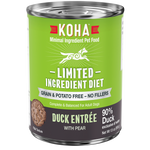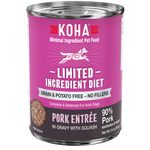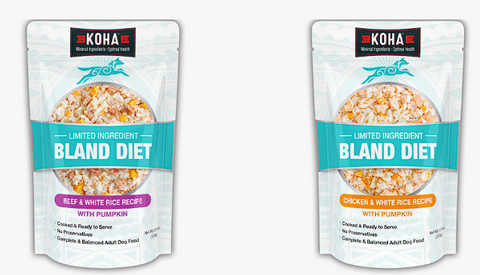
What To Give A Dog For Upset Stomach and Vomiting
Dealing with a dog's upset stomach and vomiting can be concerning for pet owners. It’s hard to know whether it’s a minor issue that will quickly go away, if they’re developing food allergies, or if it’s something more serious, like dogs with IBD.
Knowing how to recognize the signs and provide appropriate treatment is crucial for your furry friend's well-being. In this guide, we'll explore effective ways to address your dog's discomfort and let you know when it’s time to see a veterinarian.
How to Know if Your Dog Has an Upset Stomach
Identifying whether your dog has an upset stomach involves recognizing certain signs and behaviors. Here are some indicators to look out for:
- Vomiting: Occasional vomiting may not always indicate an upset stomach, but if it becomes frequent or persistent, it could be a sign of gastrointestinal distress. Vomiting is a common sign of IBD in dogs, so be sure to visit the vet if it’s persistent.
- Diarrhea: Loose, watery stools or increased bowel movements can signal digestive upset in dogs.
- Loss of appetite: If your dog suddenly shows disinterest in his beloved duck entree dog food or refuses meals altogether, it’s a sign that something’s up.
- Abdominal discomfort: Dogs with upset stomachs may exhibit signs of discomfort such as restlessness, pacing, or reluctance to lie down. They may also show abdominal bloating or tenderness upon palpation.
- Excessive drooling: Dogs may drool excessively, especially if they feel nauseous or have an upset stomach.
- Flatulence: Increased gas production or frequent passing of gas can be a symptom of gastrointestinal upset.
- Lethargy: A dog with an upset stomach may appear lethargic, lacking energy, and showing signs of general malaise.
- Changes in behavior: Watch for changes in your dog's behavior, such as increased vocalization, licking or chewing at their abdomen, or seeking isolation.
- Eating grass: Some dogs may instinctively eat grass to alleviate stomach discomfort.
- Foul breath: Unpleasant or foul-smelling breath can sometimes accompany gastrointestinal issues in dogs.
If you observe one or more of these signs persistently or if your dog's condition worsens, it's essential to consult with a veterinarian for proper diagnosis and treatment.
Your vet can conduct a thorough examination, perform diagnostic tests if necessary, and recommend appropriate interventions to help alleviate your dog's stomach upset and ensure their well-being.
Reasons Your Dog May Have an Upset Stomach
Understanding the reasons behind your dog's upset stomach is the first step towards effective treatment.
Common Causes Upset Stomach or Vomiting in Dogs
- Sudden diet changes
- Ingestion of toxic substances
- Food allergies or sensitivities
- Medication allergies
Less Common Causes Upset Stomach or Vomiting in Dogs
- Infections
- Parasites
- Gastrointestinal disorders
How to Treat Your Dog With an Upset Stomach and Vomiting
Here are some actionable steps you can take to help your dog feel better when experiencing an upset stomach and vomiting.
1. Feed Your Dog a Bland Diet
When your dog is experiencing digestive issues like upset stomach and vomiting, it's essential to provide them with a bland diet that is gentle on their stomach.
KOHA offers Limited Ingredient Bland Diet options specifically formulated to address these issues. Their Limited Ingredient Bland Diet range is ideal for dogs struggling with loose stool, diarrhea, and upset stomach.
They contain just one protein source for easy digestion and include ingredients like white rice and pumpkin to support healthy stools and regularity. Plus, they are cooked and ready to serve, making it convenient for you to provide your dog with the nourishment they need during this time.
2. Digestive Rest

When giving your dog a digestive rest, you should:
- Offer small amounts of bland food: Provide bland, easily digestible food options like KOHA Limited Ingredient Bland Diet recipes, which are gentle on the stomach.
- Ensure access to fresh water: Always have fresh water available for your dog to stay hydrated.
- Monitor closely: Keep a close eye on your dog for any changes in their condition, including improvements or worsening symptoms.
- Avoid rich or fatty foods: Steer clear of rich or fatty foods that could further upset your dog's stomach during this rest period.
- Follow veterinarian's recommendations: If your dog's symptoms persist or worsen, consult your veterinarian for further guidance and treatment options.
3. Keep Your Dog Hydrated
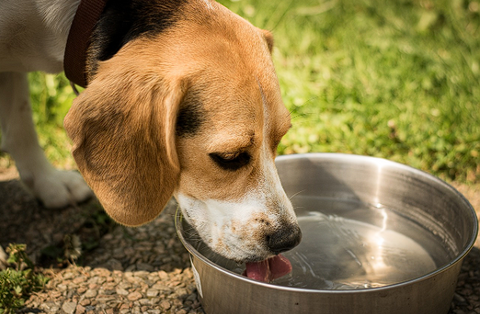
Dehydration can lead to dog constipation, weakness, and organ damage. To keep your dog hydrated during an upset stomach episode, follow these steps:
- Provide access to fresh water: Ensure that your dog has access to clean, fresh water at all times. Encourage them to drink regularly to prevent dehydration.
- Offer ice chips: If your dog is reluctant to drink water, offer ice chips as an alternative. Some dogs find ice chips more appealing and may be more likely to lick them.
- Use an oral rehydration solution: In severe cases of vomiting or diarrhea, your veterinarian may recommend administering an oral rehydration solution specifically designed for dogs. Follow their instructions carefully.
- Monitor urination: Keep an eye on your dog's urination frequency and urine color. Decreased urination or dark-colored urine could indicate dehydration and may require veterinary attention.
- Avoid dehydrating substances: Refrain from giving your dog any dehydrating substances such as salty foods, which can exacerbate dehydration.
- Provide moisture-rich food: To keep them hydrated, wet food is best. KOHA offers a range of moisture-rich formulations that are easy to digest and hydrating.
- Seek veterinary advice: If your dog shows signs of dehydration, such as lethargy, sunken eyes, or dry gums, consult your veterinarian promptly for evaluation and treatment.
4. Probiotics
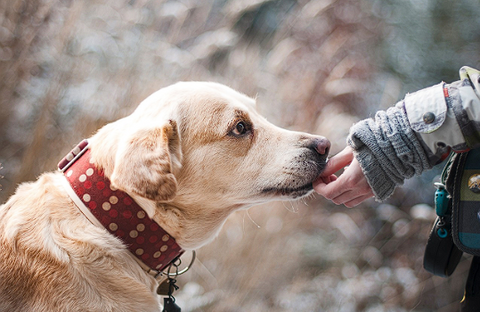
Probiotics can be beneficial for dogs with upset stomachs. Here's how to incorporate them:
- Consult your vet: Before giving your dog probiotics, consult your veterinarian. They can recommend a suitable probiotic supplement for dogs and provide guidance on dosage.
- Choose a high-quality supplement: Select a probiotic supplement specifically formulated for dogs. Look for products with a variety of beneficial bacterial strains and without any unnecessary additives.
- Follow dosage instructions: Administer the probiotic supplement according to the manufacturer's instructions or your veterinarian's recommendation. Avoid giving your dog excessive amounts, as this can lead to digestive upset.
- Introduce gradually: When starting probiotics, introduce them gradually to allow your dog's digestive system to adjust. Begin with a small amount and monitor your dog for any adverse reactions.
- Monitor response: Pay attention to how your dog responds to the probiotics. Some dogs may experience improvements in digestion and stool quality, while others may not show any noticeable changes.
- Continue as directed: Consistency is key when giving probiotics. Continue to administer the supplement as directed by your veterinarian.
- Combine with a bland diet: Probiotics can complement a bland diet, helping to restore balance to the gut microbiome and promote digestive health. Consider incorporating probiotics alongside a bland diet for maximum benefit.
5. Herbal Support

Herbs are a natural remedy that can sometimes support dogs with upset stomachs and other conditions.
However, when using herbal remedies for dogs, it's essential to consult with a veterinarian to ensure safety and proper dosage, especially if your dog is taking other medications or has underlying health conditions.
Herbal supplements should be used as directed and monitored for any adverse reactions.
6. Understand Grass-Eating

Grass-eating is a natural behavior in dogs and can serve various purposes, including providing fiber and inducing vomiting to alleviate an upset stomach. However, it's essential to recognize when excessive grass consumption might exacerbate digestive issues and lead to further complications.
To address grass-eating consider the following approach:
- Understand the behavior: Grass-eating is a common instinct in dogs and can be beneficial for obtaining fiber or triggering vomiting if they have an upset stomach.
- Supplement their diet with healthy alternatives: Instead of discouraging grass-eating altogether, implement healthy alternatives that can address the underlying issues. For example, adding pumpkin puree to their food can provide additional fiber and aid digestion without the potential risks associated with consuming grass.
- Monitor their behavior: Keep a close eye on your dog's grass-eating behavior, especially if they show signs of digestive distress. If they frequently ingest grass or exhibit other symptoms of gastrointestinal discomfort, consult with a veterinarian to address any underlying health issues.
- Ensure a balanced diet: Evaluate your dog's diet to ensure it provides adequate nutrients and fiber. Consider incorporating high-quality, easily digestible food options to support their digestive health and reduce the need for excessive grass consumption.
By understanding the reasons behind grass-eating and offering healthier alternatives, you can help support your dog's digestive well-being while respecting their natural instincts.
7. Consider OTC Medication
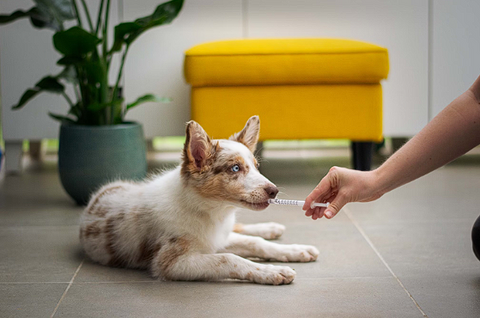
When considering over-the-counter (OTC) medication for your dog's upset stomach and vomiting, consult your vet first. They'll recommend safe options tailored to your dog's condition and needs.
OTC meds are typically short-term solutions; long-term use requires veterinary supervision for comprehensive treatment.
8. See a Vet About Your Dog Vomiting

Seeking veterinary care for your dog's vomiting is crucial for persistent or severe symptoms. If vomiting persists for over 24 hours, accompanied by other concerning signs like diarrhea, lethargy, or dehydration, consult a vet promptly. This may be a warning sign of a more significant issue.
They'll conduct a thorough examination, possibly including tests like bloodwork or imaging. Treatment may involve medication, dietary changes, or fluid therapy tailored to your dog's needs.
Follow-up appointments ensure proper monitoring and adjustment of the treatment plan. Early veterinary intervention can effectively manage vomiting and help your dog recover swiftly.
FAQs on Treating Your Dog’s Upset Stomach

What can I give my dog to settle his stomach?
Feed your dog a bland diet consisting of easily digestible foods like boiled chicken, rice, or plain mashed pumpkin to settle their stomach. Alternatively, try KOHA’s Limited Ingredient Bland Diet offerings for convenience and peace of mind.
It's essential to consult with a veterinarian before administering any home remedies or over-the-counter medications to ensure they are safe and appropriate for the dog's condition.
What medicine can I give my dog for an upset stomach and vomiting?
For an upset stomach and vomiting, consult with a veterinarian before giving any medication to your dog.Over-the-counter medications may be recommended by a vet in certain situations, but the dosage and suitability for your dog's specific condition must be determined by a professional.
Never administer human medications to dogs without veterinary guidance, as some can be harmful or even toxic to them.
How long does a dog's upset stomach last?
The duration of a dog's upset stomach varies depending on the underlying cause and severity of the condition.
In mild cases, symptoms may resolve within a day or two with proper home care, while more serious conditions may require veterinary attention and longer treatment periods.
What can dogs eat or drink for an upset stomach?
When dogs have an upset stomach, it's essential to provide them with easily digestible and soothing foods to help alleviate symptoms. Here are some options:
- Boiled Chicken or Turkey: Lean meats like boiled chicken or turkey without seasoning or skin can be gentle on the stomach and provide essential protein.
- Plain Pumpkin: Canned or cooked plain pumpkin (not pumpkin pie filling) can help regulate digestion due to its high fiber content.
- Bone Broth: Homemade or store-bought bone broth can provide hydration and nutrients, making it a soothing option for upset stomachs.
- Plain Yogurt: Plain yogurt containing live and active cultures can help replenish beneficial gut bacteria, aiding in digestion.
- Small, Frequent Meals: Offer small, frequent meals instead of large portions to prevent overloading the stomach and aid in digestion.
Avoid giving your dog fatty, spicy, or heavily seasoned foods, as these can exacerbate stomach upset.
Treat Your Dog's Upset Stomach
While these steps can help alleviate your dog's immediate discomfort, it's essential to address the root cause for long-term relief.
Consider transitioning your dog to a specialized diet like KOHA Bland Diet, designed to soothe digestive issues and promote overall gastrointestinal health.
In fact, KOHA has a wide range of options, including limited ingredient diet formulations, hypoallergenic options, moisture-rich protein in broth, superfood boosters, and even single-ingredient treats.
With high-quality ingredients, novel proteins, and gentle formulations, KOHA offers a reliable solution for managing upset stomachs, dog food allergies, and other conditions. Make the switch today and ensure your dog's digestive wellness for the long haul.
Table of Contents
- Choosing a selection results in a full page refresh.
- Press the space key then arrow keys to make a selection.

